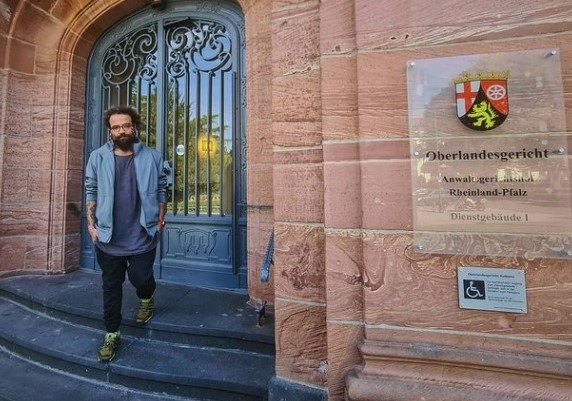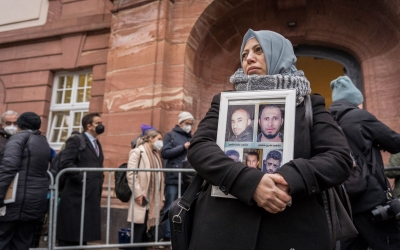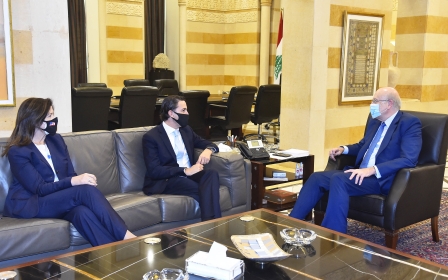Syria: Torture victim hails imprisonment of intelligence officer in Germany

A former victim of abuse and torture by the Syrian government says the imprisonment of a senior intelligence official in Germany last week has brought "closure" to his ordeal.
Thirty-year-old Firas al-Shater, a witness and joint plaintiff in the case against Anwar Raslan, an officer with Syria's infamous Branch 251 intelligence unit, said he hoped the imprisonment of the former colonel would set a precedent for other countries.
New MEE newsletter: Jerusalem Dispatch
Sign up to get the latest insights and analysis on Israel-Palestine, alongside Turkey Unpacked and other MEE newsletters
Raslan was sentenced to life in prison by a court in the German town of Koblenz last week for the killing of 27 people and the torturing of nearly 4,000.
"It brings me closure, many of us have waited several painful years for this. You should have seen the faces of people in that courtroom, almost every face was lined with tears," said Firas al-Shater.
Shater was brutally tortured during interrogation at the Al-Khatib prison, the institution overseen by Raslan, in Damascus in 2012.
"I don't know who tortured me, I was blindfolded and my hands and feet were shackled the whole time they were beating me with whips and sticks. They put out cigarettes on my body, I was sexually assaulted, many of the detainees were denied food and water, we were kept in small over-crowded cells with no room to sleep," he explained.
"Countless people were raped and sexually abused there while Anwar was the commanding officer of that prison."
It was his campaigning against the government and his work as a journalist that led him to being arrested four times in Syria.
He spent a total of almost nine months as a prisoner of President Bashar al-Assad's government, often moved between the Al-Khatib prison and the Harasta Military Hospital because of injuries sustained during torture.
After his release, he left Syria and arrived in Germany in 2013.
In the years that followed, from his sofa in Berlin, Shater would watch the ensuing civil war first engulf his hometown of Homs and then the rest of his homeland.
Investigating Assad's network
Anwar Raslan's verdict was long awaited - one of his junior officers, Eyad al-Gharib, was convicted in February last year and sentenced to four and a half years in prison.
"The verdict was a result of all the work we put into this. But if you see the reality of what they did to us in Syria, a sentence of life in prison in Germany is like a bit of a holiday for him. He deserved more than this, but we have to be happy with this because that's the way democratic countries behave," said Shater.
In a world first, Germany prosecuted two Syrian government officials who had slipped into the country along with refugees and asylum seekers during the migration wave which started in 2015.
Nearly two million Syrians and Iraqis arrived in Europe. A million settled in Germany and today, according to the German government's Office of Statistics, Syrians make up the third largest ethnic group in the country, after Turks and Poles.
There were rumours among the Syrians in Germany, Shater said, that some of Assad's henchmen had slipped into Germany under the guise of refugees or asylum seekers.
"I've been looking at this for a while now," said Shater, "we knew that some of the Syrian military and intelligence officials were in Germany.
"I know people who have bumped into some of Assad's guys on the streets here, or seen them in refugee camps."
Shater and his friends started collecting information on these men, much of their research was centred around social media, or spotting familiar faces in photographs of large groups of Syrian refugees or even at refugee centres which had sprung up throughout the country.
"Initially, it was just a couple of us, we'd normally share rumours of who someone somewhere saw, but then we concentrated our focus and energy on verifying these rumours, and soon it all became very clear that there weren't just a few of them," says Firas.
"But then we were all refugees, unaware of how the legal system worked here, worried for our own future."
So the small team of trusted friends Shater had gathered around him decided they'd hand in all the evidence to Germany's security services.
That was in 2016. Then, in a 2019 intelligence report presented to the German parliament, Germany's security services reported an increase in Syrian intelligence activities across the country.
The report says: "Germany continues to be the focus of the Syrian intelligence services. The Syrian services seem to have used the influx of Syrian refugees to Germany from 2015 to establish new structures and agent networks here. Compared to previous years, the surveillance efforts have increased significantly in 2019."
In the meantime, Shater settled down in Berlin, learning the language and making YouTube videos in order to foster better relations between the wider German society and the newly arrived refugees.
This was followed by a book deal to write about his experiences in Germany, and a subsequent national book tour and extensive features in German newspapers and television appearances.
But in 2019, after receiving several reports from Syrian refugees, of Assad government officials living in Germany, the German government arrested the two intelligence officers and started building a case against them.
That's when Shater went back to work, helping investigators to identify witnesses and becoming a joint plaintiff in the case.
Closure
After an almost two-year-long trial with more than 80 witness testimonies, including 12 defectors and thousands of photographs from a military police defector, the several thousand victims who'd been through the doors of Al-Khatib got some closure.
"You should have seen the crowds that had gathered outside the court. People had been queuing since 3am, six hours before the doors even opened. Many could still not come inside and just held a vigil outside," said Shater.
But he's eager to point out that this is just the beginning.
"Next week, I know investigations are starting on a doctor who tortured people in prison," he explained.
"But we shouldn't stop just at Assad's guys, we should do this with everyone, against terrorist organisations such as [the Islamic State], and not just in Germany but all over Europe and the world."
Middle East Eye delivers independent and unrivalled coverage and analysis of the Middle East, North Africa and beyond. To learn more about republishing this content and the associated fees, please fill out this form. More about MEE can be found here.





